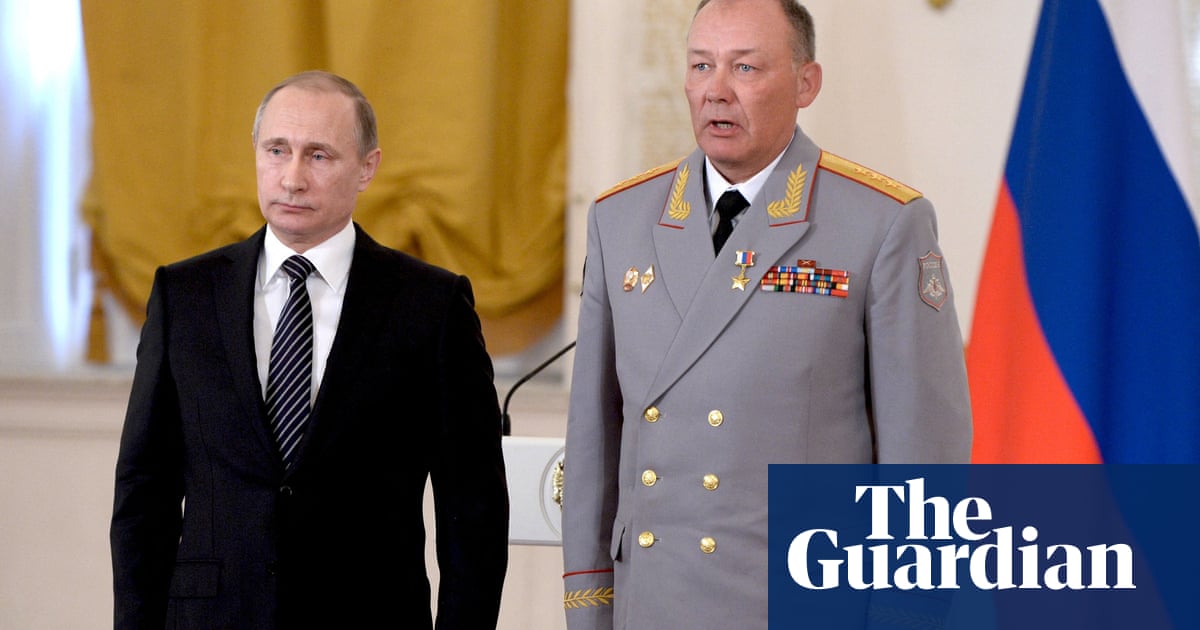
The Russian general appointed by Vladimir Putin to lead efforts to reboot the invasion of Ukraine played a prominent role in the Syrian war, where forces under his command were responsible for widespread abuses against the civilian population and were frequently accused of committing crimes against humanity.
Gen Aleksandr Dvornikov, 60, has been described as an “old school” general and a “blood and soil nationalist”, trained in Soviet military doctrines that view obliterating civilian targets as a means of gaining battlefield momentum.
A career military officer, he has risen steadily through the ranks since starting as a platoon commander in 1982. He fought during the second war in Chechnya and took several top positions before being placed in charge of the Russian troops in Syria.
Dvornikov was dispatched by Putin in September 2015 on an urgent mission to stabilise the position of the Syrian regime forces, who Tehran and Moscow believed were on the brink of falling to the opposition.
The decision to establish new battlefield leadership in Ukraine comes as Russia gears up for what is expected to be a large and more focused push to expand Russian control in the Donbas region, and follows a failed opening attempt to conquer Kyiv, the Ukrainian capital.
In Syria, Dvornikov quickly established an airbase near the north-west coast, from where bombers obliterated towns and cities across Idlib province. The fall of Syria’s second city, Aleppo, was substantially due to Russian airstrikes, which were flown from the Hmeimim base and routinely targeted hospitals, schools, bread queues and other pillars of civilian life.
The anti-aircraft batteries he installed gave Russian and Syrian jets air supremacy over Idlib, and destructive bombing runs have been carried out with impunity over the past five years. Several of the fighter pilots who took part in the Syrian war have been shot down over Ukraine.
Dvornikov was also responsible for the Russian campaign against Islamic State in Syria’s east. Russian propaganda efforts attempted to conflate the two conflicts, claiming they were fighting the same enemy on both sides of the country.
Putin’s intervention in Syria was on the pretext of fighting terrorists who were besieging the country. However, Russia’s first airstrikes did not target IS or a second jihadi group, Jabhat al-Nusra, then active in Idlib. Rather, they struck opposition groups whose attacks on Syrian armour columns had seriously weakened Bashar al-Assad’s hold on the Alawite heartland and, by extension Damascus.
The Russian offensive turned the tide of the war in favour of Assad. The war of narrative also partially tipped towards the Syrian leader, with far less scrutiny cast over Russian denials that it was targeting civilian infrastructure as a means of terrorising populations into submission, and sympathy in many quarters for the two leaders’ claims that the fight against Assad was led by jihadists as opposed to insurrectionists.
Russia’s Syrian campaign was viewed by Putin as a success, and he awarded Dvornikov the hero of Russia medal, one of the country’s highest awards. Russia lost very few troops or aircraft in the conflict and was able to maintain air supremacy throughout.
Dvornikov, who has served as commander of the southern military district since 2016, faces a very different set of challenges in Ukraine, where the Russian air force does not control the skies and its ground forces have been seriously depleted by regular supplies of advanced weaponry that was unavailable to Syrian rebels.
Just as formidable will be countering the enormous amount of data coming out of the war zone that disproves Russia’s claims of battlefield success. While Syria was regarded as the best-chronicled conflict of modern times, that effort is dwarfed by the way smartphones and digital technology have brought the Ukraine conflict to the world.
{{topLeft}} {{bottomLeft}} {{topRight}} {{bottomRight}} {{/goalExceededMarkerPercentage}} {{#goalExceededMarkerPercentage}}{{/goalExceededMarkerPercentage}} {{heading}} {{#paragraphs}} {{#ticker}}{{/ticker}}{{#paragraphs}} {{.}} {{/paragraphs}} {{highlightedText}}
{{#choiceCards}}
Single Monthly Annual
Other {{#cta}} {{text}} {{/cta}} Email address Please enter a valid email address Please enter your email address Set a reminder Sorry we couldn’t set a reminder for you this time. Please try again later. . To find out what personal data we collect and how we use it, view our We will send you a maximum of two emails in. To find out what personal data we collect and how we use it, view our Privacy Policy . If you have any questions about contributing, please We will be in touch to remind you to contribute. Look out for a message in your inbox in. If you have any questions about contributing, please contact us {{/paragraphs}}{{#choiceCards}}{{/choiceCards}}







